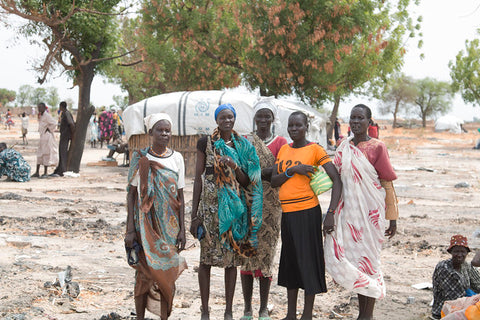Violence Against Women: A Weapon of War
Posted on July 15 2019


Pictured: Women in Thonyor, in Unity State, which is greatly impacted by conflict in South Sudan
On July 4th, we celebrated Independence Day while the people of Rwanda celebrated Liberation Day. Liberation Day commemorates the day in 1994 when President Paul Kagame marched into the capital to seize control and therefore end the genocide that killed nearly one million people. This year marks the 25th anniversary of this event. During this time of reflection, we are watching history repeat itself in Sudan after many people were raped, beaten, and killed during conflict. But there is reason for hope. It has been announced that a power-sharing peace agreement has been reached and there is new leadership.
While it is important that we celebrate this recent progress, it is also important to recognize violence against women and sexual violence as weapons of war in both Rwanda and in Sudan. Systematic rape is often utilized as a method of intimidation, abuse, and control. In Sudan, reports of rape against men and women have surfaced; however, it is historically women that are forced into prostitution, trafficking, and childbearing as means of oppression.
Women experience conflict and displacement differently than men due to the division of gender roles and responsibilities. According to a United Nations report on the Impact of Armed Conflict on Children, “More and more of the world is being sucked into a desolate moral vacuum” in which civilians rather than soldiers are the main targets of war. According to the World Health Organization, “gender-based inequality is usually exacerbated during situations of extreme violence such as armed conflict.”
During the Rwandan Genocide, between 250,000 and 500,000 women were raped; many were left pregnant and/or intentionally infected with HIV, and other unspeakable acts were perpetrated against innocent women. These crimes are disturbing and hard to process, but it is important to acknowledge that this is a part of our global history if we want to stop these atrocities from happening again.
Although women in Rwanda suffered sexual violence and became HIV positive, they were able to overcome it with opportunities for employment and the dignity of work. The Same Sky Foundation helped them earn incomes, establish their own business cooperatives, pull themselves out of impossible situations, and support their families. Today the World Bank considers Rwanda one of the best places in Africa to invest in. We can use Rwanda as a model for transformation and the positive change that is possible when there is strong leadership to restore peace.
With Sudan on their road to peace, we pray that innocent men and women are no longer used as weapons of war in conflict in the future.
Sources:
Photo https://www.flickr.com/photos/dfid/33295644744
https://static.unicef.org/graca/summry.htm
https://www.who.int/gender/violence/v7.pdf
0 comments